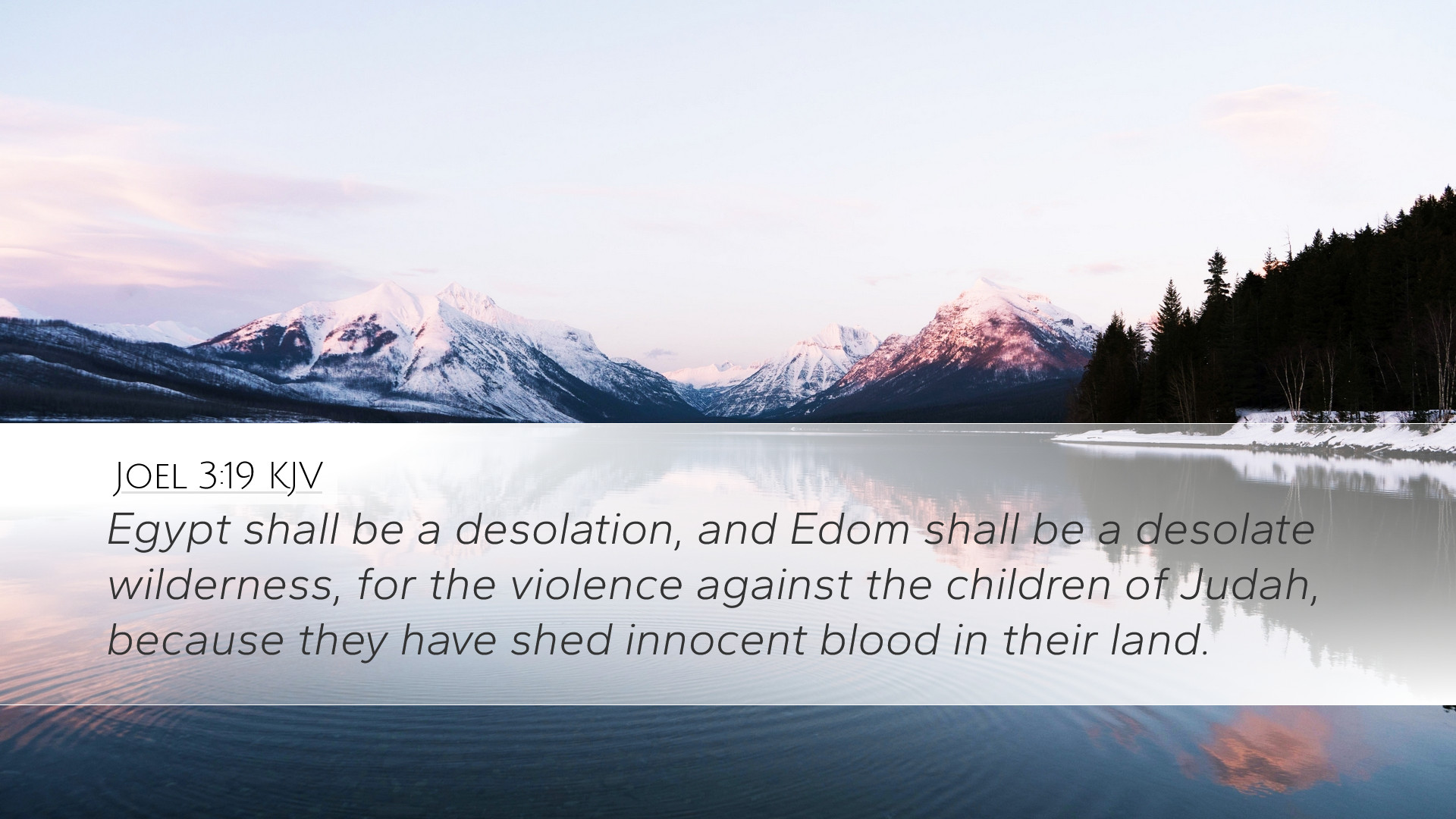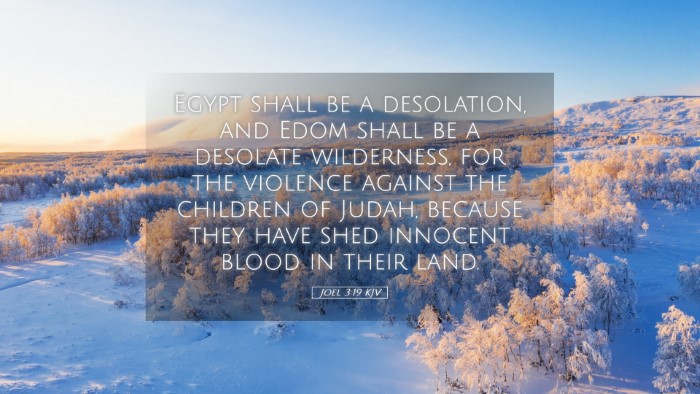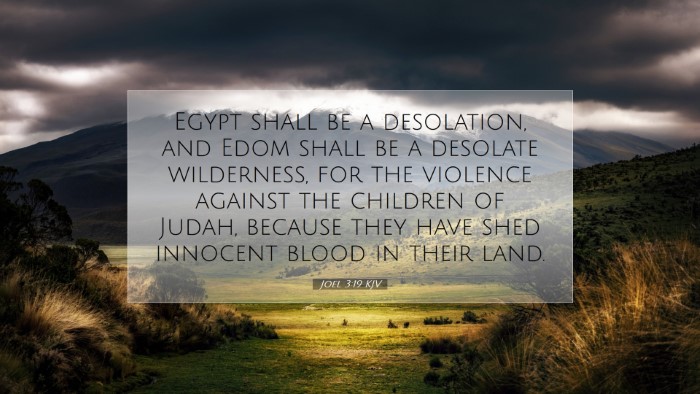Old Testament
Genesis Exodus Leviticus Numbers Deuteronomy Joshua Judges Ruth 1 Samuel 2 Samuel 1 Kings 2 Kings 1 Chronicles 2 Chronicles Ezra Nehemiah Esther Job Psalms Proverbs Ecclesiastes Song of Solomon Isaiah Jeremiah Lamentations Ezekiel Daniel Hosea Joel Amos Obadiah Jonah Micah Nahum Habakkuk Zephaniah Haggai Zechariah MalachiJoel 3:19
Joel 3:19 KJV
Egypt shall be a desolation, and Edom shall be a desolate wilderness, for the violence against the children of Judah, because they have shed innocent blood in their land.
Joel 3:19 Bible Commentary
Commentary on Joel 3:19
Verse Context: Joel 3:19, part of the prophetic book of Joel, reflects a theme of judgment and the restoration of Israel. This particular verse speaks to the consequences faced by Egypt and Edom due to their actions against God's people, illustrating the broader theological narrative of retribution and divine justice in the prophetic tradition.
Translation of the Verse
“Egypt shall be a desolation, and Edom shall be a desolate wilderness, for the violence done to the people of Judah, because they have shed innocent blood in their land.”
Insights from Commentaries
Matthew Henry's Commentary
Matthew Henry emphasizes the moral weight of divine retribution found in this passage. He states that the desolation of Egypt and Edom serves as a clear demonstration of God’s justice. Henry points out that the violence inflicted upon Judah did not go unnoticed by God; instead, it was recorded and would be judged accordingly.
- Justice and Retribution: Henry underscores the principle that God does not overlook sin, particularly the sin of violence against the innocent. Egypt and Edom, as historical enemies of Israel, are emblematic of all nations that turn against God's chosen people.
- Symbol of Judgment: The desolation mentioned represents the totality of God's judgment, shifting the reader's focus from mere physical ruin to a spiritual understanding of desolation as separation from God's favor.
Albert Barnes' Notes on the Bible
Albert Barnes provides a thorough exegesis of Joel 3:19, linking the verse to historical events following the Babylonian exile. He notes that this prophetic proclamation not only addressed a specific local situation but also foreshadowed broader implications for God's judgment on all nations.
- Historical Context: Barnes remarks on the historical significance of Edom and Egypt as powerful nations during Joel's time. Their failures and transgressions against Judah are depicted as a catalyst for their own destruction.
- Connection to the Doctrine of Retribution: He elaborates on the consistent biblical theme where nations who oppress or harm God's people eventually face divine retribution. This serves as a moral lesson for both individuals and nations.
Adam Clarke's Commentary
Adam Clarke offers a theological interpretation of the violence mentioned in the verse. He connects the specific sins of Egypt and Edom to the broader covenant relationship between God and Israel. Clarke suggests that the violence against Judah was not merely a sin against a people but against the very God who chose them.
- Divine Sovereignty: Clarke highlights God's sovereignty over nations. The destruction of Egypt and Edom illustrates that no power can stand against God's will and that their fates are intrinsically linked to their treatment of His people.
- Innocent Blood: The emphasis on "innocent blood" reminds readers of the severe implications of violence, both in a societal and spiritual context. Clarke urges a deeper reflection on the consequences of unjust actions in human and divine relationships.
Theological Implications
This verse and its commentary create a multi-faceted讨论 on how God interacts with humanity, emphasizing themes of justice, mercy, and accountability. For modern readers, the implications are far-reaching:
- Reflection on Violence: How does the modern church address violence and injustice in today's context? This verse serves as a prompt for self-examination regarding our treatment of the vulnerable and oppressed.
- The Role of Nations in God's Plan: There is an invitation for nations to seek God's favor through justice and compassion, warning that historical patterns of judgment remain relevant.
- Hope of Restoration: While the focus here is on judgment, Joel also hints at future restoration. This duality—judgment and hope—reminds believers that God's ultimate plan encompasses both justice and mercy.
Conclusion
Joel 3:19 encapsulates significant warnings about violence and judgment, but it also provides profound insights into God's character and relationship with His people. It invites a deeper understanding of moral responsibility, divine justice, and the hope for redemption. As pastors, students, theologians, and Bible scholars reflect on this verse, they are encouraged to engage with the text not only as a historical record but as a living document that speaks to contemporary issues of faith, morality, and justice in our world today.


